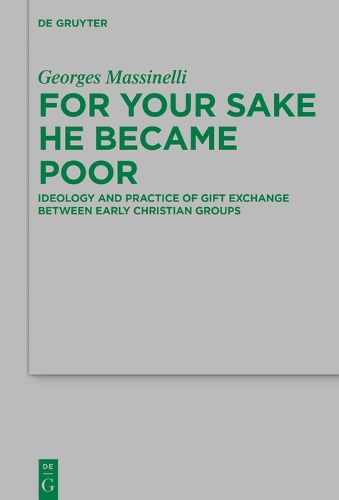Readings Newsletter
Become a Readings Member to make your shopping experience even easier.
Sign in or sign up for free!
You’re not far away from qualifying for FREE standard shipping within Australia
You’ve qualified for FREE standard shipping within Australia
The cart is loading…






This title is printed to order. This book may have been self-published. If so, we cannot guarantee the quality of the content. In the main most books will have gone through the editing process however some may not. We therefore suggest that you be aware of this before ordering this book. If in doubt check either the author or publisher’s details as we are unable to accept any returns unless they are faulty. Please contact us if you have any questions.
The Pauline collection for the poor in Jerusalem is the most famous example of financial support for geographically distant groups in early Christianity. Recent assessments of the Pauline collection have focused on patronage to explain the social relations between Jerusalem and the Pauline groups and the strategies adopted by Paul. Through a comparison with the Greco-Roman world and a close reading of the texts, this study challenges the recent approach and proposes that other factors shaped Paul’s stance. Paul was interested in reassuring the Corinthians about the financial outcome of the collection and dispelling doubts that he might take advantage of them. The collection was an action modeled on divine generosity and an exchange within a reciprocal relationship between Christian groups. This study also surveys intergroup support between Christian groups in the first three centuries CE. This practice involved churches from most of the Mediterranean Basin and was known even outside of Christian circles. Transfers of money were organized according to a consistent pattern modeled on local charitable practices. The Pauline collection had similar characteristics and can be seen as part of this widespread economic practice.
$9.00 standard shipping within Australia
FREE standard shipping within Australia for orders over $100.00
Express & International shipping calculated at checkout
This title is printed to order. This book may have been self-published. If so, we cannot guarantee the quality of the content. In the main most books will have gone through the editing process however some may not. We therefore suggest that you be aware of this before ordering this book. If in doubt check either the author or publisher’s details as we are unable to accept any returns unless they are faulty. Please contact us if you have any questions.
The Pauline collection for the poor in Jerusalem is the most famous example of financial support for geographically distant groups in early Christianity. Recent assessments of the Pauline collection have focused on patronage to explain the social relations between Jerusalem and the Pauline groups and the strategies adopted by Paul. Through a comparison with the Greco-Roman world and a close reading of the texts, this study challenges the recent approach and proposes that other factors shaped Paul’s stance. Paul was interested in reassuring the Corinthians about the financial outcome of the collection and dispelling doubts that he might take advantage of them. The collection was an action modeled on divine generosity and an exchange within a reciprocal relationship between Christian groups. This study also surveys intergroup support between Christian groups in the first three centuries CE. This practice involved churches from most of the Mediterranean Basin and was known even outside of Christian circles. Transfers of money were organized according to a consistent pattern modeled on local charitable practices. The Pauline collection had similar characteristics and can be seen as part of this widespread economic practice.